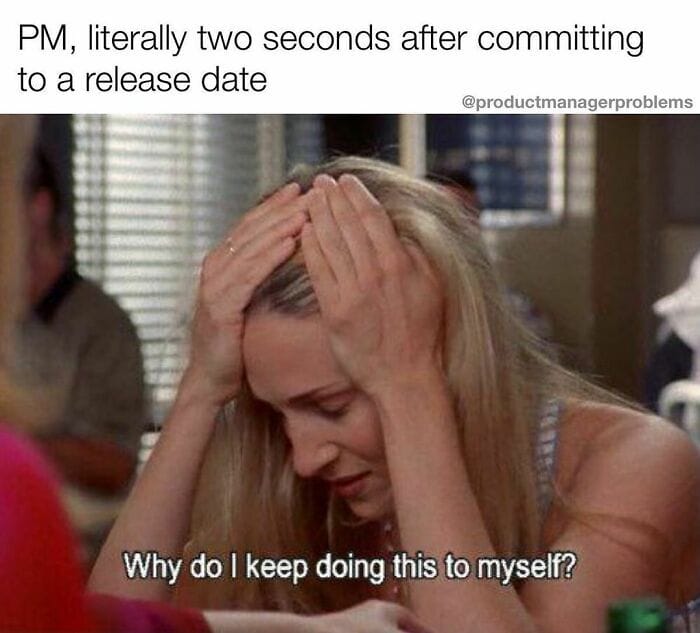- Out of Scope
- Posts
- 🚀 Why Everything Takes Longer Than You Think
🚀 Why Everything Takes Longer Than You Think
The estimation skills that separate effective PMs from overwhelmed ones
Shoutout to Nikhil for getting the riddle correct last week!
Monday night, I found this chicken enchilada recipe on TikTok that promised "45 minutes start to finish!" Perfect for a weeknight dinner. Halfway through that supposed timeline, I realized I was still cutting vegetables and hadn't even preheated the oven. Maybe I'm just really slow at chopping, but this isn’t the first time a “quick weeknight dinner” failed me.
Last week, I blocked 30 minutes to draft a PRD. An hour later, I'm still wrestling with how to word the hypothesis. The week before that, what I thought would be a "quick" data analysis turned into hours of going down rabbit holes I never saw coming.
I'm constantly surprised by how long things actually take to complete.
Time management is one of the hardest but most necessary skills in product management. People talk about timeboxing, prioritization frameworks, and saying no to meetings—but they overlook a crucial foundation: accurately estimating how long tasks actually take.
If you consistently underestimate your work, you'll either burn the midnight oil or constantly move important tasks to another day. When that timeboxed PRD session runs over, everything else in your day gets squeezed.
Why PMs Get Burned by Bad Time Estimates
My espresso machine taught me something important about estimation. When I first got it, making coffee took 10+ minutes of trial and error—wrong grind size, poor tamping technique, endless adjustments. Now I can pull a decent shot in under five minutes (although for the life of me, I still can’t make a latte heart). The difference? Experience taught me the full scope of what's involved.
The more times you do something, the better you get at estimating how long it should take. But when you're doing something new or unfamiliar, you grossly underestimate the time because you don't know everything that goes into completing the task. Every step involves discovery and learning curves you hadn't accounted for.
Product management work amplifies this estimation problem in three ways:
Most PM tasks involve discovery. Unlike repetitive work, where you build intuition, you're often doing things for the first time—researching a new market segment, writing acceptance criteria for an unfamiliar technical constraint, or facilitating your first stakeholder alignment meeting. Each involves learning curves you can't see coming.
You're orchestrating, not just executing. That feature spec isn't just writing; it's also coordinating with design, validating with engineering, getting legal sign-off, and updating stakeholders. Each handoff introduces delays you didn't account for.
Everything compounds. When your morning PRD writing time runs long, your afternoon user interview prep gets rushed, your evening roadmap review gets pushed to tomorrow, and suddenly you're in a cascade of half-finished work and missed deadlines.
Three Tactics That Actually Work
1. Decompose and multiply: Break large tasks into 15-30 minute chunks, estimate each piece, then multiply your total by 1.5. That PRD becomes: research competitive features (20min), draft problem statement (15min), outline solution approaches (25min), write acceptance criteria (30min). Total: 90 minutes, not 30.
2. Build in the "unknown unknowns" buffer: For discovery work—anything involving research, analysis, or first-time tasks—add 50% buffer time. For routine work you've done multiple times before, 25% usually covers it. Data analysis always gets the full 50% because you'll inevitably find something that needs deeper investigation.
3. Map dependencies before committing: Identify every person, team, or external factor your task depends on before you estimate. That "simple" pricing change needs legal review, engineering assessment, sales enablement, and customer communication planning. Each dependency multiplies your delay risk.
The Real Benefit
Accepting that things take longer than you think isn't a bad thing; it actually helps you be more effective. When you build realistic time estimates, you stop overcommitting and start protecting space for the strategic work that only you can do. You're not constantly playing catch-up or working late to finish what you promised yourself you'd complete during the day.
And instead of chopping so fast you accidentally cut a finger off, you can actually plan for and maybe even enjoy the 75 minutes your “quick weeknight dinner” will take.
The Riddle
What kind of room has no doors or windows?
The Meme

I should have built in more buffer time.